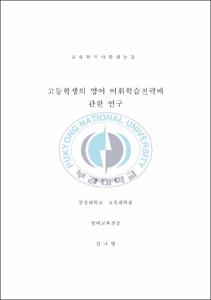고등학생의 영어 어휘학습전략에 관한 연구
- Abstract
- The purpose of this study is to investigate what vocabulary learning strategies Korean high school students use when learning English vocabulary, and to examine how often they use those strategies, and what the relationships are between the use of vocabulary learning strategies and their vocabulary proficiency. The objectives of this study are as follows:
First, to describe the types and frequencies of vocabulary learning strategies that Korean high school students use.
Second, to relate the types and frequencies of vocabulary learning strategies to students' achievement in vocabulary, as -measured by performance on tests.
In order to achieve this goal, interviews were conducted to ascertain what vocabulary learning strategies Korean high school students use. Based on the results of the interviews, a survey questionnaire was made consisting of 37 vocabulary learning strategies that Korean high school students use. After that, data was collected from a total of 113 Korean high school students (Grade 2) using the survey questionnaire to establish the types and frequencies of vocabulary learning strategies that they use. At the same time, Nation's (1990) Vocabulary Levels Tests were taken to measure the students' English vocabulary proficiency. The results were analyzed by means of descriptive statistics, factor analysis, correlation, multiple regression analysis and ANOVA.
Aside from the 11 students who didn't answer the questionnaire properly, the remaining 102 subjects were divided into three groups according to their test scores.
The major findings are as follows:
First, participants used strategies such as guessing from textual context, analyzing part of the word, and using their background knowledge to discover the meaning of a new word. Students relied heavily on visual repetition, word lists, silent repetition, and image word form to consolidate the new word.
Second, four factors were extracted from the types of vocabulary learning strategies that the participants use, which are determination strategy factors, social strategy factors, memory strategy factors and cognitive strategy factors. Students use the strategies of cognitive strategy factors the most, and social strategy factors the least.
Third, there are statistically significant relationships between determination strategy factors and vocabulary proficiency, and memory strategy factors and vocabulary proficiency respectively. The results showed that the more the students used determination and memory strategy factors, the higher their vocabulary test scores were.
Fourth, there are statistically significant differences in the use of vocabulary learning strategies between higher students and lower students. Students with higher scores in vocabulary tests make more use of determination strategy factors, such as guessing from context, background knowledge, and analyzing words. Also, higher scoring students use more strategies such as connecting the word to its synonyms and antonyms, associating the word with its coordinates, grouping confusing words together to study them, learning the words of an idiom together, and image word's meaning than lower scoring students do. Those strategies that higher scoring students use are what makes the difference between higher scoring students and lower scoring students in terms of vocabulary proficiency.
- Issued Date
- 2012
- Awarded Date
- 2012. 2
- Type
- Dissertation
- Publisher
- 부경대학교
- Department
- 교육대학원 영어교육전공
- Advisor
- 오준일
- Table Of Contents
- 목 차
ABSTRACT vi
I. 서 론 1
1.1 연구의 필요성 및 목적 1
1.2 연구 문제 4
1.3 연구의 제한점 4
II. 이론적 배경 6
2.1 학습 전략 6
2.1.1 학습 전략의 정의 6
2.1.2 학습 전략의 분류 8
2.2 어휘 학습 전략 16
2.2.1 어휘 학습 전략의 개념 16
2.2.2 어휘 학습 전략의 분류 17
2.3 어휘 학습 전략에 관한 선행연구 32
III. 연구 방법 38
3.1 예비 연구 38
3.1.1 연구 대상 및 기간 38
3.1.2 연구 도구 및 절차 38
3.1.3 자료 분석 방법 41
3.2 본 연구 46
3.2.1 연구 대상 및 기간 46
3.2.2 연구 도구 및 절차 47
3.2.3 자료 분석 방법 53
IV. 연구 결과 및 논의 55
4.1 어휘 학습 전략의 종류 및 사용 빈도 55
4.1.1 요인별 어휘 학습 전략 55
4.1.2 요인별 어휘 학습 전략 사용 비교 57
4.2 어휘 학습 전략과 어휘력 간의 관계 64
4.2.1 요인별 어휘 학습 전략과 어휘력 간의 관계 64
4.2.2 어휘력에 영향을 주는 어휘 학습 전략 요인 68
4.3 어휘력에 따른 어휘 학습 전략 사용의 차이 74
4.3.1 어휘력에 따른 집단 간 요인별 전략 사용의 차이 75
4.3.2 어휘력에 따른 집단 간 결정 전략 요인 사용의 차이 77
4.3.3 어휘력에 따른 집단 간 사회 전략 요인 사용의 차이 80
4.3.4 어휘력에 따른 집단 간 기억 전략 요인 사용의 차이 81
4.3.5 어휘력에 따른 집단 간 인지 전략 요인 사용의 차이 85
V. 결론 및 제언 87
5.1 결론 87
5.2 제언 91
참고 문헌 93
부 록 104
1. 어휘 학습 전략 설문지 104
2. 어휘 시험지 106
- Degree
- Master
- Files in This Item:
-
-
Download
 고등학생의 영어 어휘학습전략에 관한 연구.pdf
기타 데이터 / 781.83 kB / Adobe PDF
고등학생의 영어 어휘학습전략에 관한 연구.pdf
기타 데이터 / 781.83 kB / Adobe PDF
-
Items in Repository are protected by copyright, with all rights reserved, unless otherwise indicated.